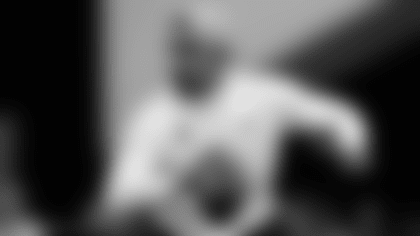Q. What did you see from CBs Cary Williams and Bradley Fletcher in the last game? Obviously, each had an interception.
COACH DAVIS: I think if you look back over the last month – and the goal of our defense is always to improve each week – I think the corner play, they're working hard, they're keeping their head down. They took some criticism early, but they keep working in their play and really the play at the ball.
We don't have guys running wide open uncontested. We had guys that are covered and they have made some plays on us. I think our guys are getting better and better at the ball of making plays. I think both Cary and Fletch had great games the other night. They really got up and challenged their receivers and that's what they do the best.
It was a good game for them. They were on them and they played the ball well.
Q. Is Fletcher looking back more when playing the ball? Much of the previous discussion about Fletcher dealt with his need to turn and look for the ball. What is he doing differently now?
COACH DAVIS: I think it has always been the same coaching point: you don't look back for the ball until you can touch the receiver, knowing that the receiver is always going exactly where the ball is thrown. Technically you don't have to look to see where the ball is thrown; the receiver's telling you where it's thrown. If you can't touch him, you can't make a play on the ball either. He'll come back to you if the ball is underthrown.
We just keep working on that and as you play the non‑verbal cues that you get from the receivers, his hands, eyes, those things. Coach Lovett [defensive backs coach John Lovett] and Coach Lyght [assistant defensive backs coach Todd Lyght] are doing a great job of working that day in and day out. We just keep throwing them deep balls and playing the ball at the catch point, and we're getting better at it.
Q. We kind of smirked early in the season about the refs calling the game tight in the secondary. Are you seeing any loosening up in terms of the refereeing?
COACH DAVIS: It changes week‑to‑week and we talk about it all the time. Find out how they're calling it early in the game, have conversations with those men, the officials that are calling it, see how they're doing it and then we'll adjust our game accordingly. If they let you get away with more, then do more. If they don't, then do less. We just kind of try to live by that and play it on a week‑to‑week process.
Q. Is this the best quarterback and the best offense in the NFC that you've faced?
COACH DAVIS: It is right now. It really is. These guys are very hot and they're very hot at home. [Packers QB] Aaron Rodgers is playing as well as you've ever seen him play. His receivers are catching everything. They've got a great plan, they have a big running back that will run downhill. They've got a balanced attack, they've got a very accurate thrower, a good decision maker [who] can get out of trouble. [He] makes good decisions, hasn't thrown very many interceptions.
The offensive line has been together for a while. They're playing well as a unit. They're not giving up a whole lot of sacks. This is probably the most balanced, efficient offense we've faced, yes. Q. Is there any way to effectively rush Rodgers?
COACH DAVIS: Absolutely. There's always a way. I think they're very high efficient offense, but we're playing better and better defensively. We'll do the things that we do and see how we match up against their protections, their run game, their passing game. We're excited about the challenge. It really will really be a heck of a test to see where we are as a defense against them.
This is what you want to do. In the NFL you get to play against the best. That's the fun part. It's not like you say, 'Oh, God, we got to go play these guys,' it's, 'Hey, let's go play these guys. Let's give them our best, let's get their best, and let's see where we stand at the end of the game.'
Q. When you were in Pittsburgh, I don't know if [former Steelers DE] Aaron Smith was there or not, but he was one of the better 3-4 defensive ends, yet nobody really recognized him. Is DE Fletcher Cox playing at that level right now? How do you quantify what he's doing this season?
COACH DAVIS: I think we've said it every week. Again, it's not sacks that matter to us. They really don't. We don't control sacks. We control how many times we move a quarterback off his spot.
Fletcher Cox is moving him off his spot constantly. We're all glad that he finally got a sack because that's when everybody kind of says, 'That's what means you're good,' but it doesn't to us as coaches. We can't control the quarterback's decision to take the sack. The quarterback can force the ball when you have pressure on him and throw an interception, or he can hold the ball and take the sack. He can [also] throw it away or intentionally ground it.
What we've got to work on is how many times can we move him off his spot and put him under pressure. Our guys, and Fletcher Cox being probably the top guy, him and [LB] Trent Cole are constantly getting the guy off the spot.
Throw [DE] Vinny [Curry] in there. Vinny is always in the backfield. They move him off the spot and then who knows who gets the sacks. It changes week‑to‑week. We're glad that collectively we're getting them, but the sack is not our measurement. It was great to have that many sacks because you get more notoriety for the players and I like to see them have success, but as a defensive staff, we're looking at moving them off the spot.
Q. Yesterday, Head Coach Chip Kelly talked about the value of returning pretty much the entire defensive group from last year with the exception of bringing in S Malcolm Jenkins. What is the value of having these guys in the middle of their second year together as a group and growing together?
COACH DAVIS: I think you see that. I know people have been saying that [LB] Connor Barwin has been rushing more, and he hasn't. The defense itself is growing in its understanding and the unit that's rushing is rushing together better. The coverage is tighter than it was a year ago, so the ball has to be held onto longer. When you hold onto guys and have the continuity, plus add to that the chemistry that these guys have, now you're growing. That's all we're trying to do. We're trying to be better this week than we were last week.
Q. Statistically, P Donnie Jones isn't among the league leaders, but how much does it impact your defense that most of his punts land inside of the 20?
COACH DAVIS: All of last year and this year now, the drive start is a huge part. We're constantly trying to figure out what's [the offense's] personality inside the 10. You don't see it much, but when you play us, you're going to have the backed‑up plays because Donnie does such a good job and the coverage unit does such a good job. The coverage units are a huge part of our defense and drive starts. Q. In what ways has LB Casey Matthews improved since you arrived here?
COACH DAVIS: First of all, you have an intelligent, instinctive football player. When you first get them, they don't know your defense, so it's tough for some of that to show. The fact that he's such a student of the game and that every week he's getting better and better and we're keeping him in the box that we think he's best at. He just continues to gain confidence in the system, in himself and in those around him. I think that makes any player play better.
Q. If something is not going well, there is a tendency to bring in a new guy. You guys really stuck to what you had last year. What did you see that made you think this process was going to keep evolving and they would pull together?
COACH DAVIS: I think you have to build a foundation. In doing that, you know there's going to be errors. It's not easy. Everybody wants it to be an instant fix, everybody playing great, everybody understanding it thoroughly. It takes repetition and repetition and repetition.
I will say this, and I know I touched on the defensive back coaches, but what you've seen out of Coach Jerry Azzinaro [assistant head coach/defensive line coach], [outside linebackers coach] Bill McGovern, and [assistant defensive line coach] Mike Dawson in our pass rush, and the emphasis a year ago was we had to teach guys how to drop, but now we've kind of refocused on the pass rush. What you emphasize in the NFL you usually get.
Those guys, not only what they're doing in the run game, but now in our pass rush, we've put more emphasis on it. You can't do everything at once. You have to grow what you want first. [First it's] stop the run, then it's, 'Okay, attack the passer.'
What you're seeing is these coaches are really getting the most out of these players. Then in the middle, the job [inside linebackers coach] Rick Minter with the help of [defensive quality control coach] Michael Clay, those guys, we have all those injuries in there, we just lost our [defensive] quarterback. What Rick Minter did, and does weekly, with preparing those guys to make our checks and calls, guys that don't have great experience, that's the stuff that needs to be talked about because those guys are doing a phenomenal job. That's why next man up is succeeding. It's because the preparation of the position coaches is really better than most teams. Q. In terms of coverage are you playing more man this year than you were last year or has it been pretty similar?
COACH DAVIS: If you remember at the beginning of the year I talked about [the fact] we had some real hard zones and some real man coverage like most people as a starting point. Then we had some bridge coverages, kind of in between man and zone. We just added more of those and I think it's given us one more element to throw an offensive quarterback and his read off. They look like pure zones, but they're not. We move in and out of those three elements. I think that's probably what you're seeing in the coverages. We understand our assignments better and that helps you play better.
Q. LB Brandon Graham saw an increase in his snaps last game. Does that have to do with him getting more comfortable with dropping or is that more to do with his ability to rush the passer? COACH DAVIS: Brandon is, in our mind, right now a complete outside backer. There are very few that can do all three great. Most of the time you want to rush the passer first. He can do that and Trent and Connor, they rush the passer well. Then they set the edge in the running game. All three do that well.
They've learned and grown in the coverage aspect, which a year ago was a challenge for us. I think all three of them, they're interchangeable. We roll Brandon in there really as the rotations go, but it's not saying that we're more confident now than we were earlier. It has nothing to do with that. Brandon has come and worked his tail off and we're excited about the reps when he's out there. We don't miss a beat with those guys out there.
Q. It seems like the Packers are shifting their offense into a different gear. Can you talk about how they're doing that with the use of their tight ends, particularly in the red zone with TEs Brandon Bostick and Andrew Quarless? How does that impact what you're doing defensively?
COACH DAVIS: Well, they have a very versatile attack. They've got a very quick, rhythmic passing attack. I know [WR] Jordy Nelson, everybody thinks that's the main target, but good offenses take what you give them. I think that's what you've seen. [In] the red zone, the use of tight ends is usually amplified.
I worked with [Packers Head Coach] Mike McCarthy in San Francisco, he's always been a big fan of the tight end and how to use it, especially when you get in the red zone. So I know him well and you see that.
When the quarterback can read what you're in and can effectively give the ball to who is open, I think that's what you're seeing. You stack that with a real solid run game, a downhill run game. Defensively, we have to defend everything. It's not like we can only defend the pass. We have to defend all of it. I think that helps the offense.
Q. You have been very effective with a four-man rush this year. How has that success with four guys had a ripple effect on your entire pass rush?
COACH DAVIS: If you can pressure a quarterback with less rushers -- the ideal is that you'd rather pressure with three because then your numbers in coverage win. When you pressure with four, you still have good numbers in coverage. When you have to go five to the rush, now there's more one‑on‑ones and you've got to be able to hold up in a one‑on‑one battle.
So, the fact that our guys are excelling in a four‑man rush helps you call the game differently, which helps the coverage numbers increase our advantage as opposed to the receivers. I think that's what you're seeing.
Q. The Packers are scoring 41.5 points at home and only 22 on the road. Is there anything to that in terms of their home-road splits?
COACH DAVIS: I don't think so. I really don't. One game at a time. You just play the best you can. Every offense is a different challenge. The game gets crazy.
Like the turnovers. There were way more turnovers [Monday night] than we've had. I don't think there's a home or away. It's how well you play in that game and how your matchups are.
Q. How did LB Marcus Smith II do in the game on Monday a week after he was inactive at Houston?
COACH DAVIS: Marcus did a nice job. Again, moving from outside to inside is a hard move because of the eye placement. If you haven't ever done it in your career, and Marcus hasn't, we're growing him. We like where he's growing right now. We saw an opportunity to get him out there and get him some reps. I believe he had 10-12 reps. He got better this game than he had been in previous games, so we like where he's growing.
Q. You can count any sack as a coverage sack. Do you have some sort of metric that says, 'Of the nine sacks, X number of these were due to coverage and X number were purely because of the pass rush?
COACH DAVIS: You know, I think it's a combination of ‑‑ the hardest tackle in football is of the quarterback. [The quarterback has] got so many things he can do. He can throw it away. That's a hard tackle in and of itself.
So we do factor in, and we talk a lot in the pass rush room about, 'Look at this coverage. There was nowhere to go and that's why your extra effort got you the sack.' The extra effort and the effort with which our guys rush, some of them are effort sacks. 'You didn't beat a guy with a real crisp move, you just outworked him. Along with tight coverage, now you've got that extra step.'
We talk in the coverage room all the time, 'Hey, how can we buy our rushers one more step?' Sometimes that's all they need. The rushers know, 'Hey, the guys are working their tails off back there. Some are one‑on‑one in press coverage with a whole lot of field to cover, I have to make these things count and I can't finish until I get them down.'
Every sack is a combination, like you said, of the coverage part of it, the effort, and then there's some that are just, 'Wow, was that a nice rush. You just made that man whiff. You had a one‑on‑one with a lineman and you won.' Those probably, as a coach when you evaluate, those are ones where you say, 'There's your pass rusher.' Then there are others where the guys are unblocked. There are others that you're mismatched and the defensive end is on a little running back. You kind of factor it all in.
That's why we say, 'Hey, did you move the guy off the spot and who were you matched up on?'
Q. You're clearly busy when the Eagles offense is on the field, but do you take a casual interest in what the opponent's defense is doing. Offensive Coordinator Pat Shurmur and Coach Kelly have indicated that they don't see a lot of out‑of‑the‑ordinary stuff from opposing defenses, they kind of see what they expect. Do you expect that opponents are thinking about pace more than scheme when they are getting ready to defend against the Eagles offense? COACH DAVIS: When you face our pace, your scheme has to go into a smaller box so you can get it communicated and you can get it executed.
One of the things I think defenses will do, is that they get less volume of defense than they face. I know in my history, other than practicing against them every day, it would have taken me to a real small box because I don't want my guys to make mistakes because of tempo. So I keep it simple.
I think that's what we get a lot of.













